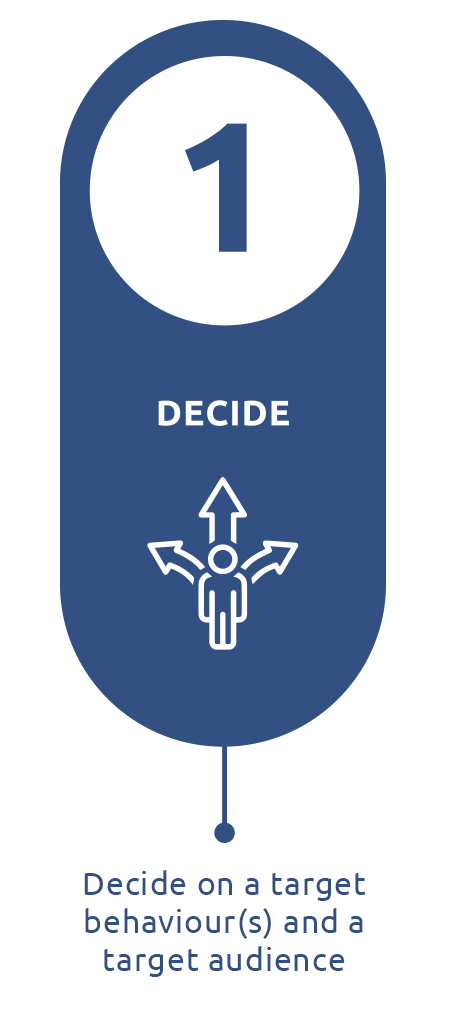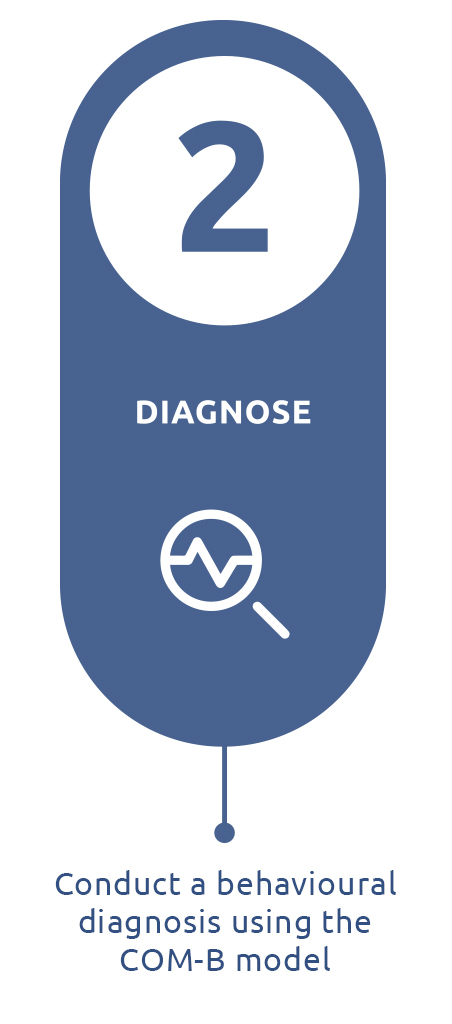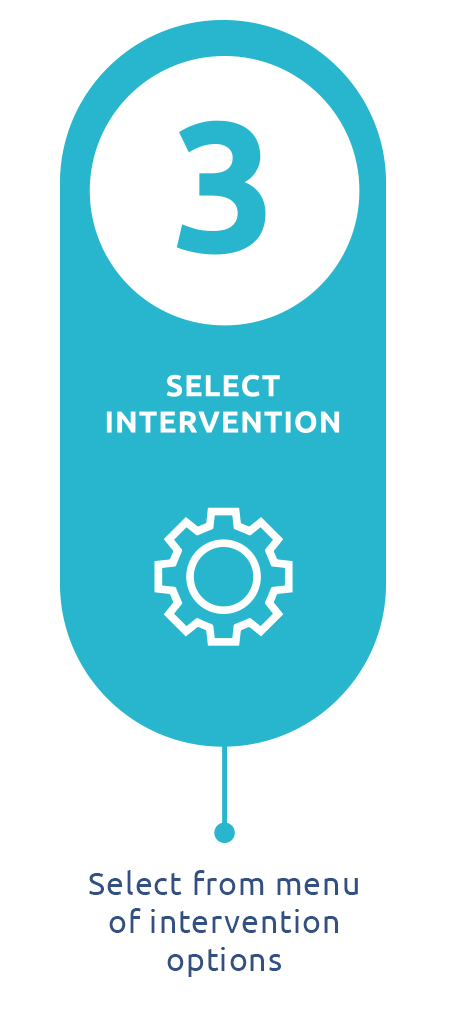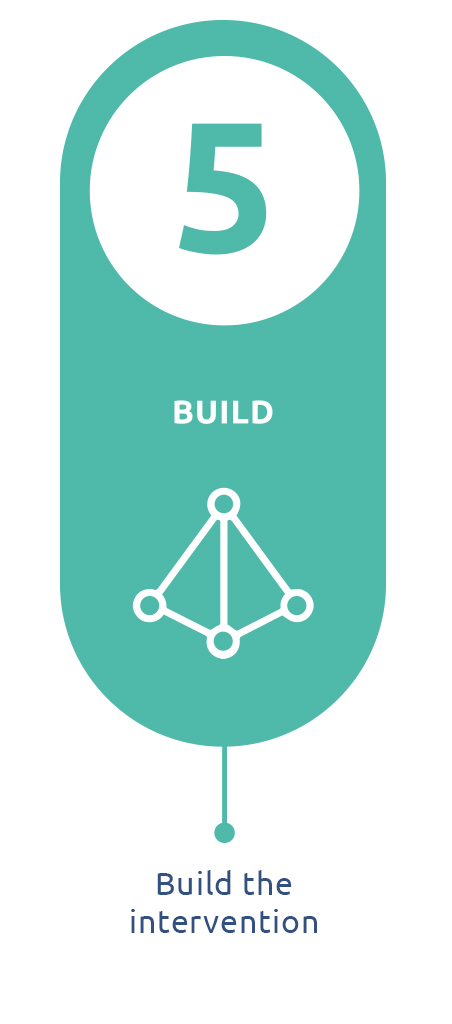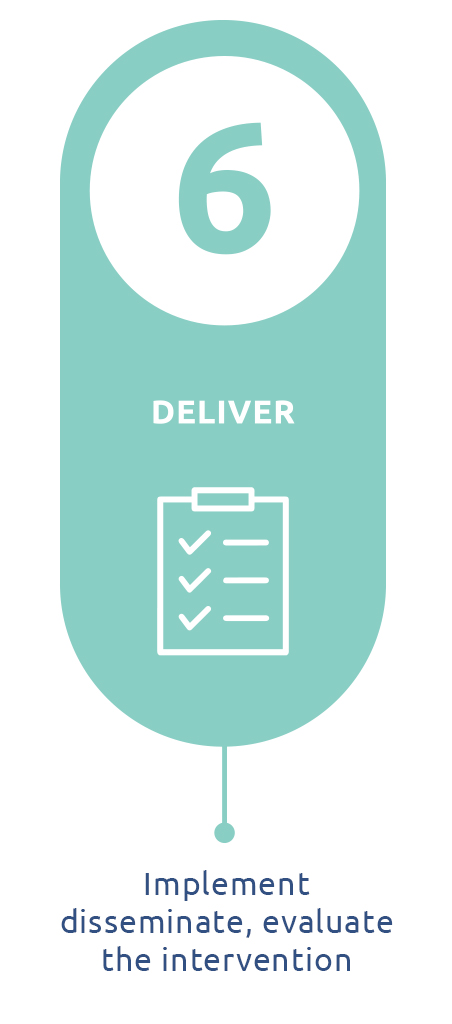Most decisions in policy, service or communications development are made by people who are not behavioural science experts, and they do not need to be. However, behavioural science can add value to the efforts of nearly all practitioners and policy makers – supporting that development is a major goal for the Unit. Developing an understanding of the basic principles of behavioural science and how to enable its application within a project, team, or organisation are key to increasing its use across the system.
Interest in behavioural science is quickly building, there are some great resources, tools, and guidance already out there for you to learn from and apply in your everyday practice. In addition to sharing our own resources, we have collated what we have found useful in the pages below.
We’ve split them up depending on which step in the behavioural science process you’re currently at, more details about the steps can be found here.
| Title | Author | Description | Resources |
|---|---|---|---|
| A Brief Introduction to the COM-B Model of Behaviour and the PRIME Theory of Motivation | Robert West and Susan Michie | A journal article introducing the COM-B model (capabilty, opportunity, motivation, behaviour) and the PRIME theory of motivation | View resource |
| Achieving Behaviour Change: A Guide for Local Government | Public Health England | A guide to applying behavioural science for local governments | View resource |
| Achieving Behaviour Change: A Guide for National Government | Public Health England | A guide to applying behavioural science for national governments | View resource |
| Approaches to Behaviour Change | Health Education England | A video introducing behaviour change techniques | View webpage |
| Barrier Identification Tool | Behavioural Insights Team | Interactive tool to identify and categorise the barriers to a behaviour you're trying to change | View webpage |
| Behaviour Change Scale-Up Toolkit | Monash University and Behaviour Works, Australia | A tool kit to help practitioners scale-up their interventions | View webpage |
| Behaviour Change Technique Taxonomy | UCL Centre for Behaviour Change | Details of 93 behaviour change techniques (BCTs) with labels, definitions and examples. | View webpage |
| Behaviour Change Techniques Taxonomy Training | UCL Centre for Behaviour Change | Training on the behaviour change technique taxonomy | View webpage |
| Behaviour Change Theory | Choosing Wisely (Australia) | This document provides an overview of behaviour change theory, and the steps you need to take to apply it in practice | View resource |
| Behavioural Diagnosis: How to collect behavioural insights | Behavioural Science Unit | A practical, interactive tool to help you develop a systematic understanding of the influences of your target behaviour, in your target population. | View resource |
| Behavioural Evidence Hub | Behavioural Evidence Hub | A repository of behaviour change projects, resources and checklists | View webpage |
| Behavioural Insight Projects | Local Government Association | A repository of case studies funded by the Local Government Association, including public health, climate change, children and young people, community safety and more | View webpage |
| Better Evaluation | Global Evaluation Initiative | Global collaboration aimed at improving evaluation practice and theory through co-creation, curation, and sharing of information | View webpage |
| Cost of Living Crisis in Wales; Applying Behavioural Science (Behavioural Science Unit) | Behavioural Science Unit | An infographic explaining how COM-B can be used to increase access to services | View resource |
| Deciding on a target behaviour and target population tool | Behavioural Science Unit | A practical, interactive tool to help you consider and define your target behaviour and target population, as you create a ‘behavioural specification’. | View resource |
| Developing Behaviourally Informed Communications (Behavioural Science Unit) | Behavioural Science Unit | An interactive tool to help you take a behaviourally informed approach when designing your communications | View resource |
| EAST Framework | Behavioural Insights Team | Information on how to make behaviour change easy, attractive, social and timely (EAST). | View webpage |
| Evaluating Behaviourally and Culturally Informed Health Interventions in Complex Settings | World Health Organisation | A framework for evaluating health interventions in complex settings | View webpage |
| Evaluating Digital Health Products | Office for Health Improvements and Disparities | A guide to help anyone developing or running a digital health product to conduct an evaluation | View webpage |
| Evaluation in Health and Wellbeing | Office for Health Improvements and Disparities | A guide to help increase knowledge, understanding and capability in evaluating health and wellbeing projects | View webpage |
| Exploring factors influencing the application of behavioural science within public health practice across Wales: A summary report | Behavioural Science Unit | A report into the exploration of factors influencing the application of behavioural science within public health practice across Wales. | View resource |
| IHI Psychology of Change Framework | The Institute for Healthcare Improvement | This paper is for anyone interested in understanding the underlying psychology to change and leveraging its power to impact quality improvement efforts | View resource |
| Improving health and wellbeing: A guide to using behavioural science in policy and practice (Behavioural Science Unit) | Behavioural Science Unit | A guide for practitioners and policy makers explaining how behavioural science can be used and applied in practice | View resource |
| Improving People’s Health: Applying Behavioural and Social Sciences to Improve Population Health and Wellbeing in England | Public Health England | A guide to applying behavioural and social science | View resource |
| MINDSPACE | The Behavioural Insights Team | This document sets out nine robust influences on behaviour, captured in a mnemonic – MINDSPACE – which can be used as a quick checklist when making policy. | View webpage |
| Motivational Interviewing Tools and Resources | Psychology Tools | Tools focused on motivational interviewing principles, four processes in motivational interviewing, and core skills in motivational interviewing | View webpage |
| Podcast: Behavioural Design | Aline Golzwarth and Samuel Salzer | A podcast exploring applied behavioural science and designing for behaviour change | View webpage |
| Podcast: Behavioural Economics Team | Australian Government | A podcast discussing behavioural economics and insights with a range of academics, experts and practitioners | View webpage |
| Podcast: Nudges for Social Good | Local Government Association | A podcast hearing from council officers about their pointers and practical examples on using behavioural insights techniques in various council services | View webpage |
| Podcast: Real World Behavioural Science | Stu King | A podcast exploring how behavioural and social sciences are being used in the real world to help change the public's health | View webpage |
| Re-imaging Help Guide | Nesta, Macmillan Cancer Support, British Heart Foundation, UCL Centre for Behaviour Change | An evidenced-based approach to helping people reach their goals - health and wellbeing interactions informed by behaviour change research | View resource |
| Responding to the Climate Crisis: Applying Behavioural Science (Behavioural Science Unit) | Behavioural Science Unit | A guide designed to support policy makers and professionals use behaviour science to create effective interventions to respond to the climate crisis | View resource |
| Ripple Effects Mapping | NIHR Applied Research Collaboration West | Online training covering what ripple effects mapping is, why it can be beneficial and how to apply the methodology in practice | View webpage |
| System Tools for Complex Health Systems | Alliance for Health Policy and Systems Research | Information on why systems thinking is important, and how to develop causal loop diagrams to help identify key leverage points within a complex health system | View webpage |
| The 7 GRAPHIC Principles of Public Health Infographic Design | Dr Catherine Stones & Dr Mike Gent | A guideline for any organisation or designer who needs to design or commission public health infographics for the general public | View resource |
| The BASIC Toolkit: Tools and Ethics for Applied BehSci | Observatory for Public Sector Innovation | Methodology that looks at behaviours, analysis, strategies, interventions and change (BASIC) | View resource |
| The Behaviour Change Wheel | Susan Michie, Lou Atkins, Robert West | A guide to designing behaviour change interventions and policies, synthesising 19 behaviour change frameworks. | View webpage |
| The Method Book | Monash Univeristy and Behaviour Works, Australia | Guidance on the methods and tools Behaviour Works use to change behaviour | View webpage |
| The Principles of Behaviour Change Communications | Cabinet Office | This guide explains how government communicators can use a behavioural approach to design and implement effective communications campaigns | View webpage |
| Theory and Techniques Tool | UCL Centre for Behaviour Change | An interactive resource to understand the links between behaviour change techniques (BCTs) and their mechanisms of action (MoAs). | View webpage |
| What’s Behavioural Science Got To Do With Me? | Sheffield Hallam University | A short video introducing behavioural science, and how it's relevant to your role | View webpage |
| WISER: A Framework for Improving Government Forms | Behavioural Economics Team, Australian Government | Factors to consider when putting together organisational forms | View resource |

